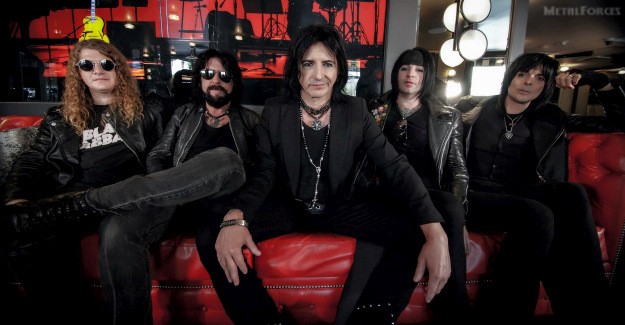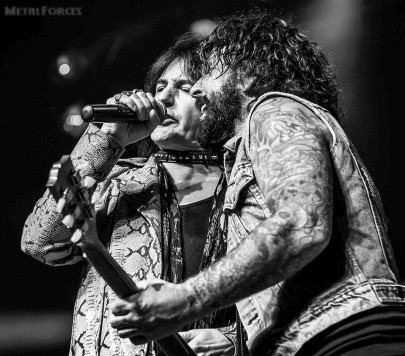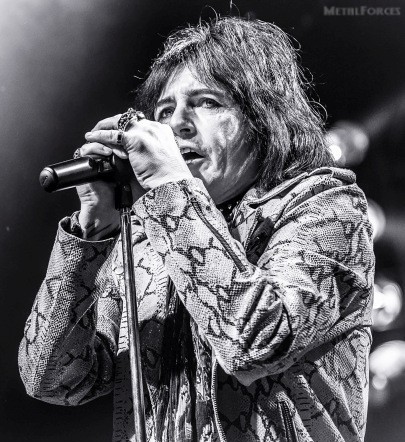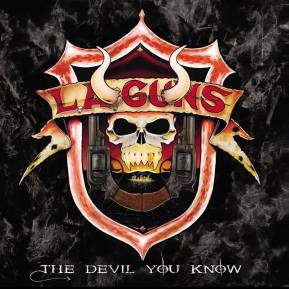
L.A. GUNS – Trigger Happy
Anthony Morgan
March 2019
 L.A. Guns (l-r): Shane Fitzgibbon, Tracii Guns, Phil Lewis, Ace Von Johnson and Johnny Martin |
![]()
Los Angeles, California-based hard rock outfit L.A. Guns authored much of 12th full-length studio album The Devil You Know – issued in March 2019 – while on tour during the promotional cycle for October 2017 predecessor The Missing Peace. Rough ideas inaugurated the process, initiated by guitarist Tracii Guns.
“Sitting down on a tour bus all day waiting to play, it can be a bit of a challenge,” reckons Phil Lewis, vocalist of L.A. Guns. “We do our best to be creative in that time. Tracii’s always playing, anyway; he’s always got a guitar around his neck. He’s always plugged into an amp or whatever and records through GarageBand on his computer, so it’s kind of a comfortable process. He’ll play something; he might play it at soundcheck, or he might incorporate it into a jam during the set. If it’s got wings, then it’s gonna fly (laughs). It sort of snowballs from there.
“When we have half a dozen of these sketches, we go into the studio and record them properly. When it’s all done and recorded, and nice and sounding good, I’ll come in. I do the vocals in New York; I do the vocals with Mitch Davis, who collaborates at writing lyrics, and is a great engineer. It’s essentially the same team, the same format. It’s basically the same template as The Missing Peace, but this one is a bit more stripped down. The Missing Peace had strings and embellishments. This is a lot more raw in the way that it sounds and the way that it was created.”
The rawness of The Devil You Know surfaced as a result of the circumstances in which the effort was created. “I think that a lot of the ideas on The Missing Peace were ideas that Tracii, Shane (Fitzgibbon, drums) and Johnny (Martin, bass) had knocking around before I joined, before the reunion,” the frontman remarks. “How far back those ideas went, I don’t know, because I wasn’t around at the time. I do know that the starting line for The Devil You Know was completely equal, though. We all started at the same time. That, and the fact that we were on tour when we were putting it together made for a more raw… Some people say a more punk rock kind of sound. I’m alright with the punk rock sound, but we’re definitely not a punk rock band. There’s such gifted players in the band, you couldn’t call them punk (laughs). It’s a fun record nonetheless, and one that we’re all incredibly proud of.”
The Devil You Know has drawn comparisons with earlier L.A. Guns fare. “People have said that it’s reminiscent of Cocked & Loaded (August 1989), and if that’s the case, then I’m alright with that,” Phil shares. “It’s L.A. Guns Mach 2, 2.0. Shane and Johnny, not to put too fine a point on it, are essentially better players than the guys in the original line-up. I’m not knocking the guys and their ability, because for the songs they played on they were perfectly adequate, but this is a very, very different machine. Apart from me and Tracii, I can’t really compare it sonically with anything from the back catalogue. It’s like brand new to me, to my ears.”
Almost 30 years separate the respective issues of The Devil You Know and Cocked & Loaded, and so sonically speaking, one would argue that with the benefit of experience, Phil and Tracii have improved through the years. “I suppose,” the singer muses. “Tracii might say that he’s a better guitar player, but it’s hard for me to tell because he’s always been on eleven. We had to do a video for ‘Killing Machine’ (from October 1994’s Vicious Circle) and the director wanted it in slow motion, which meant that we had to play it quite fast. It came to the guitar solo, which is incredibly fast at normal speed, but Tracii had to play it at double speed for the video. He nailed it (laughs). He absolutely aced it at the first take. He was waving his arms afterwards, but yeah, he’s that good. Johnny and Shane, they’ve been playing music all of their lives. Shane has been playing drums and been involved in music since he was a toddler, and the same for Johnny. They’re just real musicians, as opposed to rock stars like me (laughs).”
 Phil Lewis and Tracii Guns |
Should Tracii operate on eleven as it were, this begs the question as to which number Phil operates on. “Technically, I’m a better singer than now than I was,” he reflects. “When I listen to old Girl tapes from the Marquee, from 1979, 1980, they sound great and the vitality is there, and it puts a huge smile on my face. For me, it’s not singing so much, but more shouting in tune. You’ve got to remember, when I first started with Girl in ’79, me and Gerry (Laffy) both played guitar. We were auditioning singers at the time, and it didn’t go very well. We spent a lot of time trying to find the right singer, so in the end – out of frustration – we said ‘Look, let’s just flip a coin, and whoever loses is the singer and has to stop playing guitar (laughs).’ I lost the toss, and became the singer. It was never a dream when I was a kid growing up, like ‘Oh, I wanna be like Cliff Richard’ or ‘I wanna be like Tom Jones.’ No, I wanted to be like Alex Harvey (The Sensational Alex Harvey Band) and Gary Holton (Heavy Metal Kids).
“Over the space of time though, I got to be a better singer. When I started working with Bernie Tormé (ex-Gillan), he brought out a new side of me vocally and musically that I wasn’t aware that I had. Then all these countless covers, tribute tracks, that I’ve had to record over the years – I’ve lost count of how many I’ve done. It’s a real breeze; you go in, and it takes an hour. You bang it out, and you get paid… Very well actually for an hour’s work. Doing lots of those has made me a better singer, and then the discipline of touring. Bands nowadays, that’s how we make our money. The majority of our money is made from live shows. It means that we’ve got to be on our game, and we’ve got to be athletic in many respects. If you’re out for six to eight weeks and you’re doing four or five shows in a row, you’ve got to take care of yourself, and I do.
“My voice has served me well, so I’ve got to serve it well. I’ve got to take care of myself; I’ve got to do warm-ups before I go onstage. I’ve got to zip it afterwards – you can’t do interviews after a show. You want to – it’s so tempting – but you’ve got a show the next night and maybe even a show the night after that, so you pretty much have to just knock it on the head. You’ve got to go back to your room or get in your bunk, and that’s the discipline of the gig. I don’t hate it. It’s a pleasure doing gigs; it’s incredibly rewarding.”
Lyrically speaking, The Devil You Know ventures in different areas compared to its immediate predecessor. “The Missing Peace was very ethereal,” the musician judges. “At times, it sort of crossed over into fantasy lyrically. The Devil You Know is bitchy, and it’s right fuckin’ raw. It’s not necessarily autobiographical, or specifically about anyone. It’s about certain situations of sheer annoyance, and just frustration. It’s a lot poppier than The Missing Peace, that’s for sure.”
Penning lyrical content, certain emotions arguably have to be felt. Perhaps some emotions you feel in everyday life do not elicit inspiration. “Everyday life is me going down to Trader Joe’s, and buying a box of wine and a bag of cat litter,” Phil divulges. “No-one wants to hear about that. That’s the great thing about Mitch; he got me out of that rut, lyrically, like vampires, gypsies. All that stuff is done – we’ve played it out so many times – and it’s so refreshing to collaborate with somebody that doesn’t want to go down that corny old route.”
The involvement of Mitch Davis surfaces later in the songwriting process. “Tracii gives me the track, the demo,” the lyricist explains. “He’ll send it to me, and I’ll send it to Mitch. Mitch comes up with his ideas. I come up with mine, and we exchange sketches. By the time I get to New York to track it, it’s already locked in and I would’ve been working on it at home. I do as much homework as I can before going out there, because there’s an extraordinary amount of work involved in doing it this way. I love it, I really do.
“I go out to Long Island, and I stay at a cheap hotel, 16-17 subway stops away from the studio. It’s totally immersive. I don’t have any friends come over – I don’t socialise. I basically get up, put my clothes on, go to the studio, and then grab anything I’ve got to take for on the way back. It’s monastic, like a monk, day after day. It’s a little bit scary. I don’t mind saying that because when the tracks are all done, everything’s recorded, and the ball is in my court, or definitely in our court. We work hard on lyrics and vocals, as the guys do putting down the tracks, so it’s a great team effort. Everyone knows their job, and does it well.”
That ‘great team effort’ has grown since the 2016 reconciliation between Phil and Tracii. “It was beneficial, and we both knew,” he admits. “The first time we played after this enormous length of time and estrangement, we knew right away. It wasn’t something that would’ve come back eventually. It was right there, right away. Me getting up onstage and doing four songs, it was fine. After that, he was like ‘I’ve got these new ideas. I don’t know if you’d be interested in singing.’ As soon as I heard them, it was like ‘Fuck yeah.’ After a while, he did become a better person and so have I. Maybe we needed some time apart. That’s quite often the case, but I don’t think 16 years necessarily. Honestly now in hindsight, I think it’s a little disingenuous to our fans that we didn’t attempt a reunion sooner than that. Better late than never, though. We’ve done it now. As you can see, we’re doing everything making up for lost time.”
 Phil Lewis |
 |
![]() The 2016 reunion caused only one L.A. Guns incarnation to exist, but on December 17th, 2018, former drummer Steve Riley announced that an incarnation featuring himself would perform at the Merriweather Post Pavilion in Columbia, Maryland as part of the M3 Festival. “There can’t be another version if they haven’t done a show,” the performer replies. “There can’t be another version if they haven’t put anything out. There can’t be another version if they don’t have a singer. Yeah, there is a little bit going on, but I don’t really want to talk about it. We’re not here to talk about Steve Riley and a fictitious version. If something happens, yeah, we’ll talk about it then, but right now I just wanna talk about this record, if you don’t mind.”
The 2016 reunion caused only one L.A. Guns incarnation to exist, but on December 17th, 2018, former drummer Steve Riley announced that an incarnation featuring himself would perform at the Merriweather Post Pavilion in Columbia, Maryland as part of the M3 Festival. “There can’t be another version if they haven’t done a show,” the performer replies. “There can’t be another version if they haven’t put anything out. There can’t be another version if they don’t have a singer. Yeah, there is a little bit going on, but I don’t really want to talk about it. We’re not here to talk about Steve Riley and a fictitious version. If something happens, yeah, we’ll talk about it then, but right now I just wanna talk about this record, if you don’t mind.”
Phil arguably summed up his feelings, and so there is no issue in moving onto a different topic. “My feelings are fine,” he clarifies. “I just don’t want to give any credence to something that isn’t actually a reality. Let’s talk about this good stuff. Let’s talk about the band, and let’s talk about what we’re gonna be doing. I don’t want to waste time with that. That’s just gossip, and that’s just plain and simple. It’s all to do with a festival that takes place in Baltimore in the summer, and I don’t think your readers will be particularly interested.”
Guitar-wise, Tracii handles all parts on The Devil You Know. “He plays all of the guitars, and this is a question I get asked a lot,” Phil begins. “The thing is, these are his songs. These are his riffs that he’s coming up with, and studio time isn’t cheap, so it makes more sense. It’s more efficient for him to do the rhythm parts first, and then effortlessly go into the leads. Shane Fitzgibbon, our drummer, is basically the principle engineer of the record, so him and Tracii get together and they bang out the tracks super-fast. There wouldn’t be as much done if there was another guitar player in the studio. It doesn’t make sense, and it’s not necessary.”
The Missing Peace’s guitar parts were all handled by Tracii, the vocalist states. In light of the fact that Tracii authored the riffs for the resultant L.A. Guns material, the reasoning for such an approach is understandable. “Obviously,” he responds. “He could teach them to Ace (Von Johnson), or Adam (Hamilton), or someone, but that slows things down a little bit. They’ll learn it afterwards so they can play them live and it’ll sound great like the record, but before you get into the studio, you don’t really wanna fuck around. You just get the job done as quickly and as efficiently as possible, and get the fucker out.”
Faster Pussycat axeman Ace Von Johnson joining of the ranks of L.A. Guns was confirmed on September 28th, 2018. “Ace has been part of the same scene, the same circuit as us, for a long time,” Phil tells. “He’s a good feller, he’s a great player, and I wanted him in the band when we started talking about the reunion. We asked him. He said he would have loved to have done it, but he had commitments. He had touring, contractual commitments, that as a man of integrity, he stood by. Time went by, and things changed. As it worked out, he’s in a position now to join us. We haven’t played in the UK with him, but oh boy, you wait until we do. He really brings it.
“When we did the video for the album, he said ‘Let’s go out and have a drink at the Rainbow afterwards.’ I hadn’t been in years, so I said ‘Yeah, of course.’ We get there, and ten o’ clock becomes eleven o’ clock. He’s sitting at a table; it’s his own table, with a little brass cat behind the table with a funny phrase written on it. For somebody that hasn’t been in LA that long and not playing that long, and without any gold records, I was really impressed with his attitude. He’s no bullshit; he’s the real deal, and people like him.
“He’s a really nice guy. He’s a great player; I’m really happy to have him, and I hope that he stays. In this day and age, line-ups change and people are like ‘Oh, fucking hell. Not another line-up change.’ It’s not like the old days when the record company would give you a million, half a million dollars. You stayed together. It was everything; it was your job. You couldn’t walk away, and you couldn’t change players like you can today. There’s not that kind of label control, so things are a lot more fluid as far as band personnel goes, and we get that. It’s the nature of the industry, the nature of the beast. Some people have it stuck in their heads that it’s 1988, and it’s not.”
 |
Cutting and releasing albums would be a more profitable venture, if 2019 bore comparison with 1988. “Yeah,” the frontman agrees. “We’re not kidding ourselves. We know we’re not gonna sell anything like we did in those days, in the Cocked & Loaded days, where it sells 10,000 in the first week and then 100,000 before you know it. No, those numbers are long, long gone, but that came with its own downfalls. The label control was just overwhelming – the management controlled what you wore. It was awful. It was a lot of pressure, and I think that’s ultimately what drove a wedge between me and Tracii. We really got on in the early, innocent days, writing on the bus to the studio – writing lyrics for ‘Electric Gypsy’ (from the January 1988 self-titled debut) with not a care in the world. We just got on great, but as soon as we started to feel the pressure of the label, it took away a lot of the fun. Now we don’t have the pressure, but you don’t have the same amount of sales, so then people say ‘Why bother making records that people aren’t gonna buy, that you’re not gonna make any money out of?’
“Because you do. That’s what we do, because we have an opportunity. A label’s giving us a budget, a fraction of the old budget. We spent more on catering for Hollywood Vampires (June 1991) than we did recording this record, but if they’re prepared to take a chance, why not? Why shouldn’t we? And just the feedback alone is amazing. We never got this kind of feedback from those first records. It took a long time for people to warm up to us, as it should with a new band.
“The Missing Peace and now this album has got great feedback from so many of you guys; magazines and websites and radio stations. It means a lot, and if that carries on, we’ll carry on making them. Also, you can buy it on vinyl if you’re quick, and I really, really suggest you do because it’s a much better experience. That’s what happens with me and Tracii – we both listen to vinyl. We’re from the 70s. There’s no better feeling than going from a rough idea – the sketch of an idea – on a tour bus to putting it on the turntable, and laying down the stylus on the first track. It’s amazing. So, we do have vinyl, but not much. If you want to get it, you better be quick.”
Cover artwork can be better viewed in vinyl format. “The cover artwork is so good and so intricate, and you just don’t get that on a CD,” Phil argues. “You get a miniaturised version of it, and of course with downloads, you get fuck all. Vinyl is tangible. The ritual of pulling out an LP, and opening it, and sliding it out, and putting it on, and listening to it, and while you’re listening to it, staring at every centimetre of the cover and the sleeve notes and the credits. That’s what it’s all about.”
L.A. Guns embarking on a tour of the United Kingdom in support of The Devil You Know is a likely premise. “Absolutely,” the singer figures. “Of course we will. There’s nothing concrete yet, but the last couple of times have been phenomenal. There’s stuff going on that I don’t know about, but yeah. It’s inconceivable that we wouldn’t come. We’re really looking forward to coming back and doing this record, and playing and promoting, and launching this record over there. When we were over there, we were playing a new song from The Devil You Know and it went down gangbuster, so the UK has already had a taste of it, but yeah. Nothing concrete yet, but absolutely. Definitely guaranteed; you can take that to the bank.”
The Devil You Know was released on March 29th, 2019 via Frontiers Music Srl.
Interview published in March 2019. Promotional band photograph by Jason Christopher, with live photographs by Tommaso Barletta
Related Posts via Categories
- L.A. GUNS – Armistice (October 2017) | Features / Interviews @ Metal Forces Magazine
- SCOTTISH SICKNESS – A Report On The Scottish Death Metal Scene, Featuring BRAINBATH, PUTRID FATE And RANCID CADAVER (October 2022) | Features / Interviews @ Metal Forces
- LARVAE – Join The Hardcore Cult! (June 2022) | Features / Interviews @ Metal Forces Magazine
- TRENCH FOOT – Sacrificing Morals For Gory Obscenities (June 2022) | Features / Interviews @ Metal Forces Magazine
- CANCER – Crimes So Evil (November 2018) | Features / Interviews @ Metal Forces Magazine
- U.D.O. – The Tank Drives On (August 2018) | Features / Interviews @ Metal Forces Magazine
- L.A. GUNS – O2 Academy, Islington, London, England (August 31st, 2018) | Live Reviews @ Metal Forces Magazine
- SIEGE OF POWER – Bleeding For The Cause (August 2018) | Features / Interviews @ Metal Forces Magazine
- MOONSPELL – A Taste Of Live Eternity (August 2018) | Features / Interviews @ Metal Forces Magazine
- MONSTROSITY – Dark Matter Invocation (August 2018) | Features / Interviews @ Metal Forces Magazine
|
|





